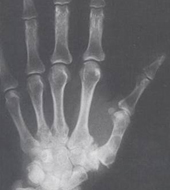Specialist hand surgery could help millions of people
with the three most common hand ailments

Interview with Prof. Dr. G. Björn Stark, Medical Director of the Department of Plastic Surgery at the Medical Center – University of Freiburg.
Prof. Stark, you head one of the few Medical Center departments that specializes in hand surgery. What is noteworthy about the hand?
The hand is one of the most unique human organs. We take its work for granted: only if we experience pain or loss of function do we learn to appreciate its importance in everyday life. The human hand is perhaps our most complex and sensitive moving organ. Performing hand surgery requires lengthy specialist training and experience, as well as extensive knowledge of specialized equipment. Proficiency with micro-surgical and endoscopic instruments and technology is also essential. Along with these skills, careful examination and diagnosis is necessary to achieve an optimal treatment plan. Traditionally, hand surgery has often been performed on the side by fairly inexperienced surgeons, without the necessary training, practice and microsurgical equipment. Many physicians are also not up to date with the latest reliable surgical treatments for very common hand ailments like Dupuytren’s contracture, Carpal tunnel syndrome and various forms of tenosynovitis. Ineffective treatments without proper diagnoses can often go on for years, frustrating patients. People come to feel that they simply have to live with their increasing complaints as side effects of getting older. The level of information about modern specialized surgical treatments is very low!
In these circumstances, what can you do? Operating on an organ as delicate as the hand seems very risky.
Our team treat various hand ailments, injuries and malformations. First we have to make a clear diagnosis, often just based on clinical experience. Frequently, this is quite easy! But if required we also have all kinds of CT and MRI as well as subspecialists in arthroscopy. There are three hand ailments that are becoming very common in people over 45 – I call them “The Big Three”, affecting millions of patients:
- We regularly perform surgery relating to nerve constriction problems such as Carpal tunnel syndrome (CTS). We were among the pioneers globally in developing a minimally invasive endoscopic micro-surgical procedure for CTS, using very small incisions of just 8 mm.
- Dupuytren’s contracture causes increasingly crooked fingers and can be treated with a micro-surgical procedure.
- Many patients suffer from arthrosis/osteorarthritis, often occurring at the base of the thumb, which can be treated effectively with thumb arthroplasty. After the operation, patients only need a small thumb cast for three weeks.
Millions of people suffer from CTS, Dupuytren’s contracture and thumb osteoarthritis, and thousands from the results of faulty treatments. Others are told that they are too old for surgery to be worthwhile. But the reverse is true: the older we get, the more we depend on a well-functioning hand to live well!
How are these operations performed?
Many surgical hand procedures can be performed using local or nerve blocking anaesthetics, either as an outpatient or with just a few days in the hospital. Some more complicated hand operations can take several hours. Rehabilitation has been speeded up considerably due to specialization, microsurgical techniques using operating microscopes and magnification loupes, endoscopy and modern biotechnology like fibrin glue. Results are now very reliable, and most patients only have to stay a few days.
Hand surgery sometimes requires ongoing follow-up care, often involving specialist physiotherapy and rehabilitation. We therefore emphasize the importance of an individualized pain management program following surgery.
Back to your question: Is it risky? Of course it can be, if I consider the many damaged hands we see from all over the world, arising from negligently performed hand surgeries. This is what happens when blacksmiths try to repair delicate watches!
On the other hand, it is extremely satisfying to see how patients unnecessarily handicapped by and suffering from “The Big Three” hand ailments can be healed so effectively.
Back